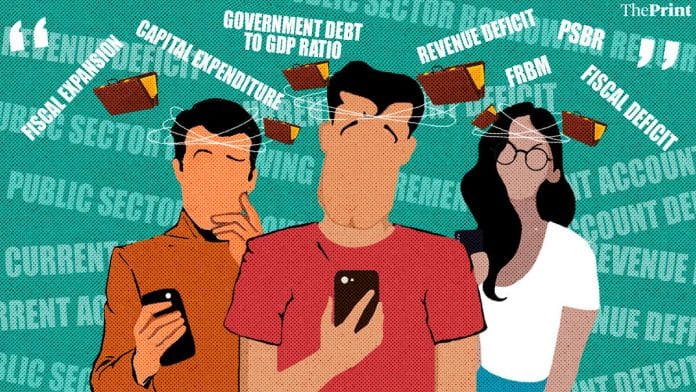New Delhi: As the Modi government gears up to present its first budget in its second tenure, terms such as revenue deficit, fiscal expansion, Public Sector Borrowing Requirement (PSBR) and revenue expenditure are much bandied about.
For novices, the budget period can be a minefield of economic jargon. So, ThePrint attempts to simplify some of these terms to make it easier to navigate the budget that Finance Minister Nirmala Sitharaman will present Friday.
Fiscal Deficit: In a country, a government earns revenues through sources such as taxes. A government also incurs expenditure. When the total expenditure of the government exceeds its total revenue, the government has to borrow this excess amount from the market. This amount that the government borrows is its fiscal deficit.
A high fiscal deficit increases interest rates and can put inflationary pressure on the economy.
Fiscal Expansion: This happens when a government decides to go beyond its targeted levels of fiscal deficit and borrows more, say, for instance, in the event of an economic slowdown.
Government debt to GDP ratio: As a government keeps borrowing every year to finance its fiscal deficit, its debt builds up. A ratio of this debt level to the GDP of the country, indicating how much has been borrowed in total relative to the size of the economy, is the debt to GDP ratio.
FRBM: The Fiscal Responsibility and Budget Management (FRBM) Act enacted in 2003 sets targets for the government to reduce its fiscal deficit levels over time.
Also read: Indian Navy says budget barely meets requirements, wants more funds for modernisation
Public Sector Borrowing Requirement (PSBR): It is a measure of all the borrowings done by the central government and its entities such as Public Sector Enterprises. PSBR can also include the borrowings of the state governments, their entities and even the local governments.
Revenue Expenditure: This expenditure is of a recurring nature and is made on items such as employee salaries, interest payments on borrowed capital among others.
Capital Expenditure: This is the occasional expenditure made on capital investments such as constructing buildings, buying equipment and construction of highways among others.
Revenue Deficit: A revenue deficit occurs when a government’s realised net income is less than its projected net income.
Current Account Deficit: A current account is one of the components of the Balance of Payments, which essentially summarises a country’s economic transactions with the rest of the world for a particular period of time. The current account includes goods and commodities bought/sold, services provided, income receipts including income from the ownership of assets and unilateral transfers such as remittances. A current account deficit occurs when the value of goods and services we import exceeds the value of goods and services we export.
Direct and Indirect Taxes: Direct taxes are those made on personal or corporate income, property or wealth. Indirect taxes such as GST and customs duties are those paid on goods and services.
Also read: Budget 2019: India has a law to cap fiscal deficit but UPA and NDA couldn’t care less






